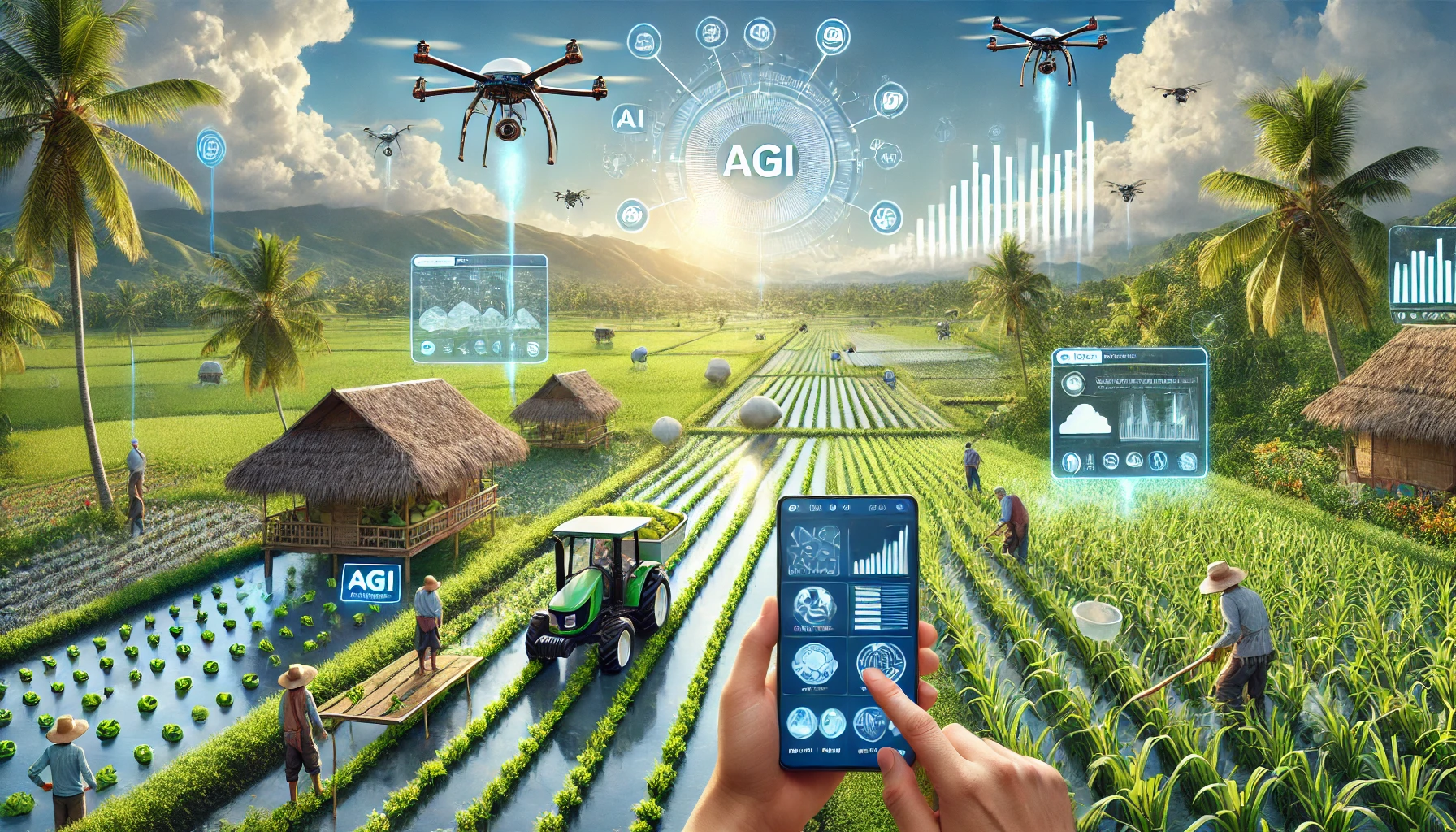The agricultural sector in the Philippines, a cornerstone of its economy, faces challenges like low productivity, resource inefficiencies, and vulnerability to climate change. However, Agri-Tech startups can transform these challenges into opportunities by leveraging Artificial General Intelligence (AGI). Unlike narrow AI, which focuses on specific tasks, AGI mimics human intelligence across a wide range of functions, enabling it to address complex agricultural problems holistically.
Here’s how Agri-Tech startups in the Philippines can harness AGI for profitability and sustainability.
1. Enhanced Crop Management Through Predictive Analytics
AGI can analyze diverse datasets—weather patterns, soil health, crop conditions, and pest behavior—to provide actionable insights for better crop management. Startups can offer subscription-based platforms that provide farmers with tailored recommendations, improving yields and reducing losses.
For example:
- AGI systems could predict typhoon impacts on rice fields, enabling pre-emptive measures.
- Real-time pest and disease diagnostics can guide farmers on immediate interventions.
2. Smart Resource Allocation
Water scarcity and rising fertilizer costs plague many farmers. AGI can optimize irrigation schedules and fertilizer usage by integrating data from IoT sensors and satellite imagery. Agri-Tech startups could monetize this technology by offering it as a service or licensing it to agricultural cooperatives.
Potential Business Models:
- Pay-per-use for smallholder farmers.
- Tiered subscriptions for larger agribusinesses.
3. Farm Automation with AGI-Driven Robots
AGI-powered robots can perform tasks such as planting, weeding, and harvesting with higher precision and efficiency than human labor. Startups could develop and lease these robots, reducing operational costs for farmers.
- Example: AGI-enabled drones can plant seeds and spray crops, even in remote areas, reducing labor dependency.
- Startups can provide maintenance and upgrade services, generating recurring revenue.
4. Supply Chain Optimization
Farmers in the Philippines often face logistical bottlenecks that lead to post-harvest losses. AGI can analyze real-time data to streamline the supply chain, reducing spoilage and ensuring better market prices for farmers.
Startup Opportunities:
- Building AGI-driven platforms that connect farmers directly to buyers.
- Predicting demand trends to minimize overproduction and wastage.
5. Climate-Resilient Farming Solutions
Climate change poses a significant threat to agriculture. AGI can simulate various climate scenarios and recommend adaptive farming practices. Agri-Tech startups can position themselves as leaders in climate-resilient farming, offering services such as:
- Crop diversification strategies tailored to specific regions.
- Forecasting tools for climate risk management.
6. Precision Livestock Farming
AGI can also revolutionize livestock farming by monitoring animal health, optimizing feeding schedules, and predicting disease outbreaks. Startups can profit by creating AGI-powered systems that improve livestock productivity.
- Example: Startups could develop wearables for cattle that monitor health metrics and provide actionable insights.
7. Accessible Microfinancing and Risk Management
AGI can assess farmers’ creditworthiness based on alternative data sources and provide personalized financing solutions. Startups can collaborate with financial institutions to offer microloans, ensuring financial inclusion for smallholder farmers.
Moreover, AGI can improve crop insurance models by predicting risks with high accuracy, making insurance affordable and effective.
Challenges and How to Overcome Them
1. Limited Digital Infrastructure
While rural connectivity is improving, gaps remain. Startups can partner with government programs and NGOs to deploy AGI solutions in offline modes.
2. Farmer Resistance to Technology
Awareness campaigns and pilot programs showcasing the tangible benefits of AGI can help build trust among farmers.
3. High Development Costs
Collaborations with global AI organizations and academic institutions can reduce R&D costs. Moreover, leveraging open-source AGI frameworks can accelerate development.
Conclusion
The Philippines’ agriculture sector is ripe for disruption, and Agri-Tech startups are poised to lead this transformation. By integrating AGI into farming practices, startups can boost agricultural productivity, enhance sustainability, and generate significant profits.
For a country that depends heavily on agriculture, the widespread adoption of AGI is not just a business opportunity—it’s a pathway to food security, economic growth, and rural empowerment. Agri-Tech startups that seize this moment will not only profit but also contribute to a resilient and future-ready Philippines.
Author’s Note:
The adoption of AGI in agriculture is still in its nascent stages. However, with the right partnerships and innovations, the potential for impact—and profit—is immense. The key is to act now and invest in this transformative technology.
[SEO optimized]



Pingback: AI & AGI Business Opportunities in the Philippines: Pioneering Innovation in a Booming Market(Published: January 25, 2025) - evertslabs.org